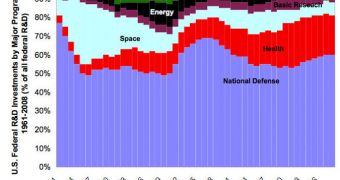The Review of Human Space Flight Plans group, appointed by the Obama Administration to assess the American space agency's situation, ambitions, funding plans and future plans, is about to soon make its final recommendations to the President. In the meantime, its members have announced that no more public meetings will be held from now on, after a busy schedule of visiting several cities within only a few months. But the information that already made its way into the media hints that NASA will be brought down more firmly into reality.
One of the main conclusions that the panel has come to is that the space agency is severely underfunded for all of the endeavors it plans to take on over the next few years. Its dream of reaching the Moon again, and maybe even Mars, may be unsustainable altogether, or may require massive, private support in order to come true. The group is also looking at ways to boost the agency's development, by drawing out new lines of development, and new collaboration opportunities between it and the private sector.
The panel also plans to breach the massive gap that exists at NASA, between talks and action. Over the past two presidential terms, when George W. Bush was still in office, the official position of his Administration was to support space exploration. As a result, large-scale plans appeared, which, however, were deprived of real and complete funding. This led to the discrepancies that the agency now faces, and which it must be helped to overcome, committee members believe.
The fact is, the panel says, that NASA simply does not have sufficient funds allotted to allow for its return to the Moon within this generation. “They don’t do anything for us anyhow. Anything we can do, we can do it better, cheaper, and faster with robots. And I mean cheaper by a factor of 10 to 100. Human beings are just not very good spacecraft,” American Institute of Physics former Executive Director Bob Parks, now a University of Maryland physicist, argues, quoted by Wired.
It remains to be seen exactly what the panel will propose. At this point, its members are working on reducing the number of possible development scenarios for the agency to only a handful. They had to go through over 3,000 pieces of data, before finally combining them into seven possible future plans. Now, they plan to collapse them into a lower number as well. The final decision is highly expected, and it will undoubtedly influence American space exploration for the years to come.

 14 DAY TRIAL //
14 DAY TRIAL //